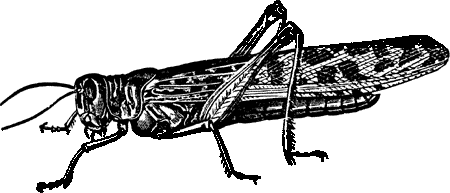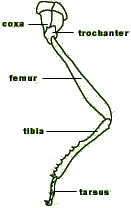
![]()
The thorax of the grasshopper is partially covered by a strong shield and
by the wings.
Its thorax is divided into three segments and each segment bears a pair of
legs. The legs
look not unlike the legs of a crustacean and have a series of joints (see
illustration)
and come to an end with two curved claws. Between these claws is a spongey
pad which helps
the grasshopper keep its footing on surfaces. It also allows it to grasp little
things.
The forward two pair of legs are the standard insect legs used for walking.
Pretty average.
The last pair, however, are special. They are specialized for jumping, and
boy do they
work. They have one joint called the femur and it contains muscles for jumping
and is
enlarged out of proportion to the others. Connected also to the thorax are
the
grasshoppers two pairs of wings. The pairs differ. The first pair serves not
for
flight, but as a cover for the hind wings. It is the hind wings that do all
of the
flying, really. They are broad during flight, but fold up nicely under the
first pair.
The differing wings is an attribute somewhat unique to the grasshopper. In
most insects,
the two pairs of wings are similar and both are used in flight.
 |